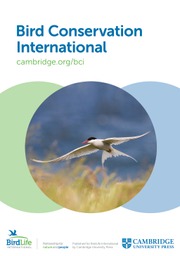No CrossRef data available.
Article contents
Hydropower reservoir reduces Great Argus Argusianus argus density in proximity to its shore
Published online by Cambridge University Press: 12 November 2021
Summary
Habitat degradation due to hydropower development within protected areas has a marked negative effect on resident wildlife species. However, efforts to develop appropriate conservation and management plans are hampered by a general lack of quantitative information and a poor understanding of relevant ecological constraints. Great Argus Argusianus argus, a large galliform species sensitive to habitat degradation, can reflect the impacts of the Chiew Larn reservoir in southern Thailand on local wildlife. Great Argus abundance in the remaining lowland areas of Khlong Saeng Wildlife Sanctuary (KSWS) was estimated using line transects along the Chiew Larn reservoir edges and in the forest interior between February and April 2017. The population estimate for KSWS was 108 individuals (95% CI: 41–272) based on the sampled area of 18.06 km2, with a density estimate of 5.9 calling males/km2. The abundance increased with increased distance from the reservoir shoreline, which might be related to the high level of direct and indirect human disturbance close to the hydropower reservoir.
- Type
- Research Article
- Information
- Copyright
- © The Author(s), 2021. Published by Cambridge University Press on behalf of BirdLife International


